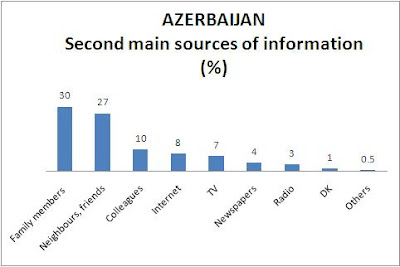Education is considered to be a crucial factor for social development. According to the 2011 Caucasus Barometer (CB) survey, much of the Georgian population considers education to be an important factor to get a good job in Georgia. Public interest in education is high and many Georgians think that the quality of secondary education has improved during the last five years.
The CB 2011 asked Georgians to choose the most interesting issue they would like to learn about from a provided list. Just over half of the population (55%) said they would like to get information about how much the government spent on education in 2010, which falls far above the interest in getting information about television stations’ owners (6%), political parties’ donors (5%), and government spending on military and defence in 2010 (6%). The high amount of interest in the government’s spending on education is one indicator of the high importance that the population ascribes to education.
Source: CB 2011
The 2009, 2010 and 2011 CB surveys asked Georgians what they consider to be the most important factor for getting a good job in Georgia. The data reveals an interesting trend. Much of the Georgian population attaches increasingly high importance to education, while the importance of social connections for getting a good job in Georgia has decreased during the past 3 years. In 2008 just under half (43%) of the adult population thought connections was the most important factor for getting a job, while this share decreased to 19% in 2011. In 2011, education became the most commonly mentioned factor for getting a good job in Georgia.
Source: CB 2009, 2010, 2011
Moreover, over half of the population (66%) thinks that the quality of secondary education has improved during the last five years and only 9% believe that it has worsened. A small part of Georgia’s population (9%) thinks that the quality of education has not changed at all and 15% either do not know or refused to answer the question.
Source: CB 2011
CRRC also asked Georgians what they think their level of English and Russian knowledge is and what foreign languages they think should be mandatory in secondary schools. Despite the fact that more people in Georgia report a better command of Russian, Georgians support having English as a mandatory subject in secondary schools (69%) - much more than Russian (14%). According to the 2011 CB, 62% of the population say they have no basic knowledge of English, while this share decreases to 9% in the case of Russian. 20% say they have intermediate or advanced knowledge of English, and 74% say the same for Russian.
Source: CB 2011
To sum up, education is gaining increasing importance and interest among the Georgian public who positively evaluate the quality of education in secondary schools relative to the past 5 years. CB data indicates that more Georgians consider education to be an important factor for getting a good job, and there is an increasing demand for English knowledge. In other words, the importance of education for getting a good job and knowledge of English is gradually replacing the importance of social connections for the former and the demand for knowledge of Russian with respect to the latter.
You are also welcome to explore the newest data about education and other social issues via CRRC’s Online Data Analysis tool.










